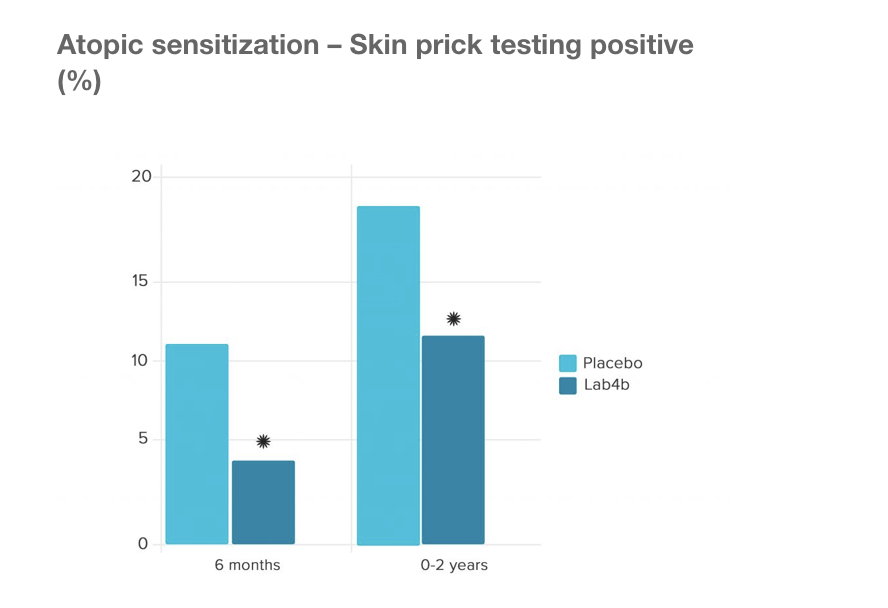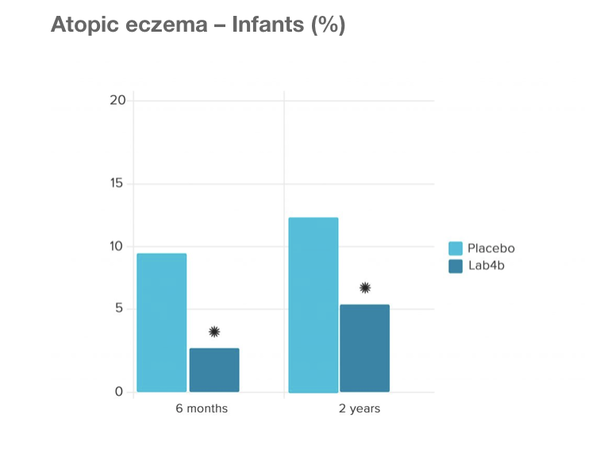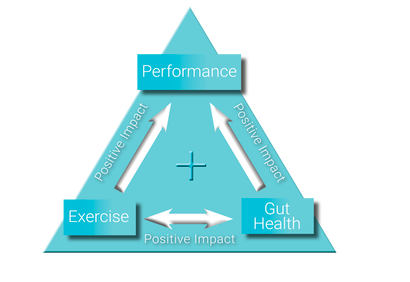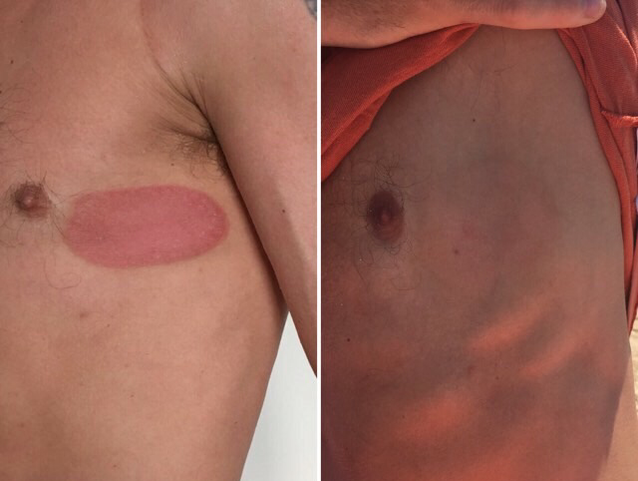|
Have you been told that your baby has reflux? Are you trying to get your head around what that means and what to do next? I'm here to help.
2 Comments
Eczema or atopic dermatitis is a chronic skin condition often causing red itchy inflamed skin which can range in severity from mild to severe. According to statistics around 15 million people in the UK live with this condition and in 2015 GP’s in England wrote around 27 million prescriptions for various topical agents costing around £169 million. If you are thinking to yourself that more and more people are suffering from this you’d be right in your assumption. An NHS funded study has shown that the numbers of cases have risen by 40 % in 4 years. What we do know about the condition is that it is an allergic condition with 80% of sufferers having raised IgE antibodies. Eczema patients have positive allergy tests and around two thirds have a family history. Many also suffer from other atopic conditions such as asthma and hay fever. The standard treatment protocols involve simply managing symptoms via emollients and sometimes steroids and if infection is triggered due to scratching, antibiotics. Allergens are also tested for although these tend to focus on only IgE mediated reactions. Other considerations…. Immune function We are back to finding our root cause. So first lets look at what’s going on in the immune system. The allergy antibody IgE is elevated in 80% of cases and this is activated by a type of white blood cell, a helper cell called TH2. Mast cells can release higher amounts of histamine leading to the itch that we associate with eczema. Then there’s the issue that around 90% of sufferers also have a predominance of the bacteria Staphylococcus aureus on the skin which their immune system is unable to kill. Often scratching can activate this infection and cause some potentially severe staph infections. So how do we prevent this vicious circle? Well we have to do everything we can from day one to promote our gut/immune function. In our immune system we have regularly T cells sometimes known as Treg, which are involved in immune suppression and immune tolerance. It’s known that an unhealthy gut can lead to a decrease in these important cells and therefore an imbalance in our TH1/TH2 cells with the TH2 cells being unregulated. Studies have indicated that the use of probiotics from birth can confer a reduction in TH2 dominance and symptoms of AD at 13 months old versus placebo. Breast feeding Studies have shown that breast feeding is associated with a reduced risk of eczema and other allergies. However there is a caveat here in that although breast milk may confer antibody protection, in at risk children it may also be necessary for the feeding mum herself to remove common allergens which may unwittingly be triggering the problem as these proteins pass through the milk. Common allergens being dairy, peanuts and eggs. That said, the advice is to introduce these common allergens while breast feeding at the 6 to 12 month stage and to then continue to breast feed for a further 6 months following this introduction. Older and formula fed children In older and formula fed children a study looking at triggers for eczema indicated that Peanuts eggs and milk have been shown to account for 80% of adverse reactions to foods in people living wth contact dermatitis. Other common triggers and are wheat, fish and soy. The hygiene hypothesis. Are we just too clean? Epidemiological studies, especially those looking at migration from one country to another indicate that we acquire the same immune disorders as soon as we move to another area so environmental factors are playing a huge role. Lifestyle changes have led to a decrease in infection in the industrialised world and this has been shown to be inversely correlated with increases in allergies and autoimmunity. Studies have also shown that exposure to animals or growing up on a farm confers protection from a young age as we are exposed to a greater variety of bacteria which leads to activation and modulation of innate and adaptive immune response. In one large Swiss study, nearly 14,000 children were surveyed between 2006 and 2007, with over 3,000 farming children and around 11,000 non-farming children. In this study, 38% of the non-farming children had allergies compared to 19% of the farming children. Digestive compromise Those living with allergies have commonly got some level of digestive compromise and dysfunction. Stomach acid which normally assists in the removal of infection and therefore has a protective role, can commonly become low and therefore play a role in weakening our immune system and make us more prone to infection. It also sets us up potentially for the leaky gut phenomenon which puts us at risk of further food sensitivities of the IgG variety (delayed reaction) and chronic inflammation. If you have intestinal permeability you may also be experiencing other health challenges e.g. fatigue, brain fog, headaches, depression, sinus, IBS, reflux, joint pain, and autoimmunity. This is also why I see many clients in clinic who may be coming along for help getting to the root of their eczema but who also have any number of the aforementioned symptoms. A lack of a very important nutrient zinc can ensue as a consequence of low stomach acid. This nutrient is essential for immune, gut, hormone and skin health. It affects appetite, smell and taste of food, so in children who have a narrowing of food choices and are no longer enjoying certain foods, zinc deficiency may be at the heart of this. It is also a particular problem in cases of acne in teenagers so look out for changes in eating and appetite in older children and test their zinc levels. This can be done with a very simple taste test which all the family can do. Adequate zinc is also required for healing the gut. Gut Flora and probiotics Because our immune system resides primarily in the gut we need to look at gut bacteria. We also need to weed out any trouble makers Interestingly yeast overgrowth is a common cause of eczema. It’s also a very common problem as the western diet of high sugar, refined carbs and low fibre sets up the perfect conditions for this to grow. In addition, yeast overgrowth can result from long term medication use e.g. antibiotics, steroids and the oral contraceptive pill. We therefore need to ‘weed and seed’ the gut, get the infections out and the good bacteria in to assist with immune balancing and symptom resolution. Risk factors for allergies in children This relates to those factors which influence the health of the micro biome from day one. In an ideal world we need to be focusing on the gut health of mum prior to a planned pregnancy as this is what baby inherits. Areas of concern are
The Swansea Study This was a large study by the University of Swansea Medical School with 454 mother/baby pairs who were given Lab4b probiotics containing Lactobacilli and Bifidobacteria both during the final month of pregnancy and the first 6 months of infancy to evaluate whether this would prevent allergy in children. The results showed that versus placebo, the probiotic groups did indeed confer a protective effect on prevention of eczema and also prevention of allergic reaction to common allergens including pollen, cows milk, eggs and dust mites. Prof. Steve Allen, concluded the following key message from the trial:‘Lactobacilli and Bifidobacteria administered to pregnant women and infants aged 0-6 months prevented atopic sensitization and atopic eczema. The babies given the Lab4b probiotics were 57% less likely to develop atopic eczema than those receiving the placebo. The babies given Lab4b were 44% less likely to develop allergic reaction to common allergens, including pollen, cow’s milk, egg and house dust mite. Stress
Stress is very much linked with gut/immune function and when we are stressed we are more likely to have a flare of these conditions so managing stress for young and old is a life long strategy for eczema management. Adaptogen herbs can be helpful as can mindfulness, meditation and essential oils such as lavender for relaxation. As those living with eczema have a tendency towards poor absorption due to gut compromise a common nutrient which we can find ourselves low in is magnesium and this is also because we actually use more of it when we are stressed. More tips here on how to maintain levels. Nutritional therapy/ Functional medicine approach for eczema The nutritional therapy approach involved recognition of all of the above factors and follows through with the following stages.
Further testing This can be done if required and in addition to either allergy or food intolerance testing we can offer stool testing to identify infection and imbalance and even cortisol testing if stress is a particular trigger. Supplements This really does depend on the individual. It depends on what else they may be presenting with, their individual root cause/s, what medications they are on etc. However core supplements to include are going to be probiotics to reinoculate the gut, omega 3 and vitamin D. We may also recommend supplements and diet change to support gut integrity and immune balancing as per above recommendations. More info on booking an appointment with us for adults and children here. Referenced Studies Burks AW, Williams LW, Mallory SB, et al. Peanut protein as a major cause of adverse food reaction in patients with atopic dermatitis. Allergy Proceedings 1989;10:265-269. Von Mutius E, Vercelli D. Farm living: effects on childhood asthma and allergy. Nat Rev Immunol. 2010;10:861–868. Allen SJ et al 2014. Probiotics in the prevention of eczema: a randomised controlled trial. Archives of Disease in Childhood 99(11): 1014–1019 A subject that we're getting more and more questions about these days is how food intolerance can impact sports performance. Testing is growing in popularity as more and more of our top professionals have found that removing foods that they are intolerant to can have a big impact not only on their health but also their performance. In the Tennis world, it was Djokovic who famously removed food intolerances in his diet and he credits this for his ability to remain at the top of his profession. Food intolerance is estimated to effect 45 percent of the population and can show itself in a variety of symptoms, for example, headaches, migraines, IBS, eczema, joint pain, unexplained fatigue among others. More on food intolerance and health can be found here. One of the difficulties for sports people and a common trap that they can fall into unwittingly is that they can follow diets that can become quite repetitive and find themselves eating a lot of the same foods which can itself lead to food intolerance. An example of this would be eating a high number of eggs as it is a protein rich food. But if we become intolerant to this food, we can find ourselves with various symptoms, fluid retention and sub-optimal sports performance. Another common intolerance is to dairy products, so imagine the number of sports people out there who are regularly consuming whey based proteins in shakes and protein bars who may be impairing their performance without realising it. Intolerance to specific foods can also lead to challenges around weight management, so if you are finding that you are struggling to lose weight even although you believe that your diet and exercise program is optimal, it may be that you have underlying food intolerance which could be driving inflammation and leading to some challenges around losing weight. Typically people find that they lose a few of those extra pounds fairly quickly after removing problematic foods as they lose fluid retention and going forward find that they are better able to maintain an optimal weight for them. A number of studies have indicated that a risk factor for food intolerance in sport can result from very intense training which can impact our immune system negatively and lead to impaired intestinal barrier function which allows food proteins to find their way into our blood system. One study published in the British Journal of Sports Medicine concluded that "sports performances and health in elite athletes depend on food intolerance in many ways. The elimination diet for 3 months significantly improved health, body composition and faster lowering HR after cardiopulmonary testing." The particular test that we offer is from the Lorisian laboratories and they have a number of case studies after working with a number of high profile sports professionals and sports teams, notably Newcastle United and Wigan Warriors Rugby League Team. Some examples of individuals are marathon runner Paula Radcliffe, Professional rugby players Peter Stringer and Rob Vickerman, triathlete Matt Perry, International Hockey Player Mike Shaw and runner Dani Rowlinson. Paula Radcliffe found out she was intolerant to egg, chicken, wheat, tomatoes and dairy and said, “After I cut these foods out of my diet, I was able to run without doubling up in pain. I have a lot more energy and I am back to my normal self. It truly made such a difference to my life and I would recommend it to anyone else suffering from symptoms like these.” England Rugby 7's player Rob Vickerman had always followed a protein rich diet designed to help fuel his training and assumed the foods he was eating were the best possible choices to compliment his exercise. He said, "At no point throughout my professional career did I even think about awareness of my nutritional make up. I, like many of my peers ticked the usual boxes of high protein quantities, low carb and fats without really knowing what was good for me or why." Rob Vickerman is a classic example of someone eating the very foods he was intolerant to and in very high amounts which led to some health challenges. He says, “To overlook what fuelled me meant I was perhaps missing the most important information contributing to my performance. I used to react somewhat 'typically' after taking protein shakes, seemingly no different to the majority of my teammates. I never questioned this, nor the fact when I had eggs I would have a similar reaction, bearing in mind I was having 20-30 eggs a week.”
Triathlete Matt Perry also benefitted his sports performance after taking the test. He said, ”I have lost over an inch from my waist and lost 17lbs in weight. My energy levels throughout the day are higher; I am more focussed and clear headed. Also in my first triathlon of the season I knocked 17 minutes off my time from last year... A simple test and re-education on your eating habits can turn your life around.” Are there any other tests relevant to optimising sports performance? One that I recommend is the Optimal Nutritional Evaluation which is a simple and convenient urine test which analyses key nutritional biomarkers including antioxidants, B vitamins, minerals, digestive support and amino acids. The report also gives advice not only on any nutritional deficits you may have but also suggested nutrients and optimal dosing for you to rectify any deficiencies or imbalance. Our nutritional status is impacted not only by what we eat but what we absorb of what we eat. We may therefore require further support in the form of digestive enzymes and probiotics. As excessive sport is known to impact free radical damage, we also need to be mindful of optimising antioxidants in the diet. Another factor which we can't underestimate in sport is stress, not only because it impacts performance but also because it can have a negative impact on our digestion and absorption of nutrients. Another test which may therefore be appropriate in some cases is cortisol. It is well known in sport that mind set and keeping stress under control can be pivotal in taking us to the next level. For further information for individuals or for teams contact us at [email protected] or phone 01224 969637. We are open Tuesday to Saturday. Getting to the bottom of your skin conditions... There are many possible triggers and drivers for skin problems from acne to psoriasis to eczema to a whole array of lesser known skin conditions which often have their roots in diet, immune, nervous system and digestive health. Common triggers can be viral, bacterial or fungal, or based on contact allergies. Often we fall prey to these things following a period of extreme stress or long term use of particular medications. If you’ve been struggling with a long term skin condition and are not getting to the bottom of it, give us a call or pop in and find out whether we can help you get to the root of the problem. We offer full consultations and a variety of blood testing including food intolerance and allergy testing. Stool testing can also be relevant in some cases. It’s always great to get a successful outcome and especially when it’s a skin problem as we understand how upsetting this can be and can really affect confidence and self-esteem. This is a great testimonial from one of our recent clients who came and had a food intolerance test to see if he could uncover some important clues. We couldn’t be more delighted for him at the result. Here is what Adam from Aberdeenshire had to say: Adam's story... "How I got my skin better after 2 years of struggling." “Two years ago, after returning from a friend’s wedding, I broke out in a rash all over my torso. Initially I thought it was chicken pox, as one of the guests children had this, however it was diagnosed by my GP as Pityriasis Rosea. The rash cleared up on its own after 3-4 weeks and I thought nothing more of it. Then a few months later, I noticed a similar 'herald patch' appear on my torso. Initially it was quite small, around the size of a penny. I thought it was the same rash reappearing, and took no notice, as I thought it would clear up on its own as previously. Several months passed, and the patch continued to grow. It was now 2 inches in diameter and was inflamed and very itchy. I became embarrassed and self-conscious, and was applying an assortment of creams and oils in an attempt to eradicate this, all unsuccessful. My wife then suggested to see a nutritionist as she thought that the rash could have been worsened by a food intolerance, and booked me an appointment that week to see Beverley. I had a food intolerance test which takes a few minutes, along with a consultation to explain my circumstances, and then waited 1 week for the test results. I found out that I was intolerant to cow’s milk & yeast, and immediately started to completely remove these food types from my diet. I also supplemented my diet with curcumin to help alleviate inflammation and caprylic acid for its anti-fungal properties. I was amazed that around 4 weeks later, the rash had almost disappeared and the skin had completely healed. I'm now at week 6, and the rash has completely disappeared. This has opened my eyes, and I firmly believe that with the correct diagnosis, the body can be fully restored from within, with the simplest of dietary changes. Thank you so much Beverley (and my wife!) for your help, support, and nutritional insight.” So you'd like to know more... For further information on Nutritional Therapy or Food intolerance testing please contact us on [email protected] or 01224969637 or pop in for a chat at our new clinic and shop at 44 St Andrew Street, Aberdeen, AB25 1JA. 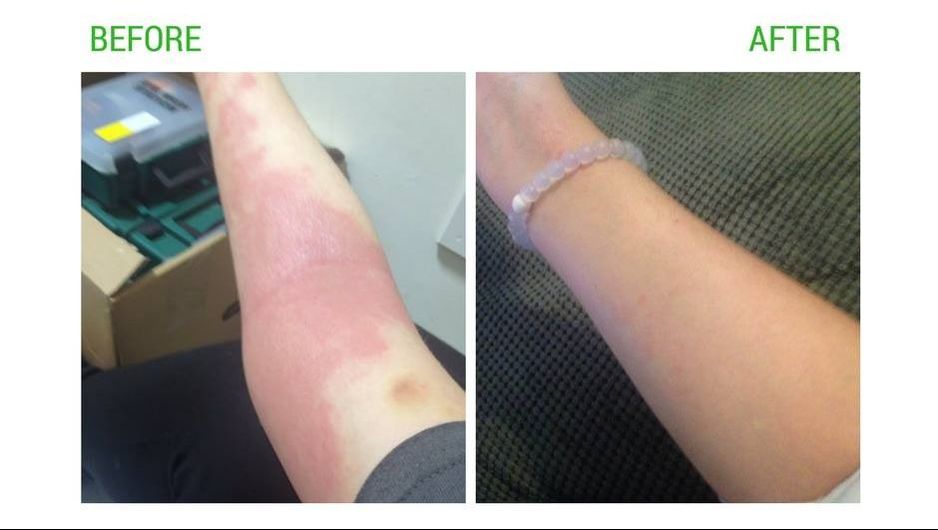 Last year the Daily Mail published a fantastic story about a woman who managed to stop her migraines after cutting out corn and dairy products from her diet – with the help of a nutritionist and a food intolerance test! She had suffered terribly on a weekly basis for years on end, which is so sad to see when the cause was something as simple as eliminating a couple of foods from her diet. Food intolerance testing can help people tackle all sorts of conditions be it head related, stomach problems or skin conditions. I’m so glad I found out about it! I first developed eczema at the age of around 14 during my standard grade exams. The doctors put it down to stress, and not knowing any better, I simply agreed and went along with it. It was a pretty stressful time in my school life, and having never had any real problems with my skin prior to this, I guess it made sense at the time. Seven years later though, when the medicated creams failed to work time and time again, and the eczema kept coming back more and more aggravated each time, I began to question whether there could be something more to my flare ups than just stress. I visited Beverley in April last year for a food intolerance test – after my little brother had received his results for his own testing with regards to his abdominal pain. I was amazed that the test had managed to narrow down his problems to specific foods and as my brother had done so well and his symptoms had gone away I wanted to know if the foods I was eating on a day to day basis could be the culprit for my irritated skin! My results came back just one week later, and I took out chilli, garlic, ginger, yeast, gluten and dairy and was recommended to avoid these for 3 months and then re-introduce slowly and see how my skin reacted. It was definitely a thought to begin with – I was so used to eating whatever I wanted be it chocolate, crisps, pizza etc., I was a sucker for convenience food! I can honestly say now that my diet is much more varied and relatively healthy now which is a huge benefit having gone through this process. Since having switched my diet, I have seen a huge improvement in my overall health, not just my skin. My eczema has improved tremendously, and although it has flared up a little on my hands right now – this normally happens when the weather goes from one extreme to another. When my diet was mostly rubbish based, I would often take a nap during the day as I would get quite tired around 3pm. I can now function like a normal person from 6am – 11pm without a nap, which is a massive improvement as I can actually do things after work and with my evenings! Finally, the results that I have been most pleased with is my stomach. I no longer feel bloated on a day to day basis. I no longer need to eat and eat and eat to feel full, and I’ve lost around about a stone – solely from switching around my diet (and eating more!), and no extra exercise, which is amazing. I’ve since introduced all of the spices back into my diet with no problems as of yet – and I’m currently playing around with yeast too. At the moment I have no intentions of introducing dairy or gluten foods back into my diet. Of course this is all still a work in progress, however I’m absolutely delighted with all of my results. I feel a whole lot healthier on the inside and out - and would very much recommend a visit to a nutritionist if you feel that your diet could be improved, but you don’t know how to go about it. I also highly recommend Food Intolerance testing as it is life changing and saves years of unnecessary visits to the doctor and endless rounds of steroids. Wish I had done it sooner! - Lauren, Aberdeen If you would like to find out more about food intolerance testing or book an appointment pop in and see us at Nourishing Insights, 44 St Andrew Street, Aberdeen, AB25 1JA or call 01224 969637. 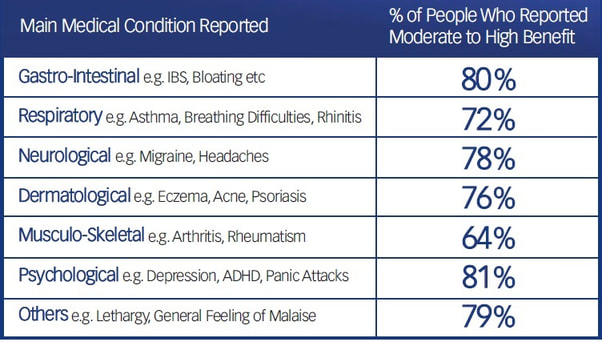 Available at Nourishing Insights clinic and shop at 44 St Andrew Street, Aberdeen or can be done at home. Food Intolerance testing can help a variety of conditions. If you have been suffering for some time and are getting by on endless rounds of pills which only offer symptomatic relief at best, food intolerances may be behind your continued health challenges. This test is suitable for children from 2 years old and involves a simple pin prick test. I offer a free 20 min consultation by phone to discuss your needs further and will advise as appropriate for each case. Test results are back within 10 working days. For small children our preferred approach is the gold standard which is an elimination diet. Ultimately the focus with our service is about getting to individual route cause and working on gut healing so as to restore immune tolerance and introduce most foods back where possible. Intolerance versus allergy. The test involves a simple pin prick test which goes off to a UK registered Medical Laboratory. This test is an IgG test which looks at your Immunoglobulin G response to particluar foods. There is much confusion and misinformation about food intolerances and what they actually are. An 'Allergy' is where you have an instant reaction to something as is often the case with common allergies to foods such as nuts and shellfish or even a bee sting. This can be a mild allergic response to a severe and sometimes even life threatening reaction where the person can go into anaphylactic shock. For these stronger reactions, it is necessary to carry a preventive medicine such as an epipen and serious care needs to be taken in managing this condition. The immunoglobulin involved in this case is IgE and testing for this is often done via the NHS. However we can now offer allergy testing also at our clinic if this is required. IgE testing at our clinic is also a pin prick blood test and the test offers both food and environmental allergens. An 'intolerance' on the other hand, involves an IgG response and the challenge with this is that it is often less obvious to the person experiencing it. Many people live for years without even considering that they may have one. That said, many of us know exactly when we've eaten something that our body doesn't like and a reaction can be fairly quick following a meal and can be quite severe. What is interesting is that when the results of a test come back, they often validate what the person was expecting and are thus very reassuring. One of the challenges is that it can take up to 72 hours to experience an IgG reaction which means you could for example, eat a potato on a saturday and have migraine on a monday and not join the dots between the two. So if you are one of those people who are not making the connection with food triggers, this could be why. The delayed reaction also makes it slightly trickier and time consuming when doing diary taking and elimination diets, although I also offer this approach and it works really well for many. It is of course possible to have both allergies and intolerances. For example you may have an 'allergy' to latex or nuts and a 'food intolerance' for dairy and yeast. There is also the option to test for both IgG and IgE at the same time if this is preferable. Nutritional protocol. Of course, there are other issues running alongside intolerances and the protocol for dealing with them involves more than just removal of identified triggers! This is where a Registered Nutritional Therapist comes in as I can ensure that you are well supported for total nutrient intake. I may also recommend further testing either via your GP or privately to identify other culprits. Ultimately, I will work with you to achieve balance and wellness across all body systems and tackling all of your health challenges in turn. We will also work together to heal the gut at cellular level and support digestive enzymes, stomach acidity and other fundamental aspects of optimal digestive health.This way, you will be able to re-introduce some foods as you heal over time and build back immune tolerance. Nutritional Therapy deals with the root cause of these problems. A food intolerance may indeed be causing your migraine. However, the ultimate cause is the reason for the food intolerance in the first place. This takes us to 'leaky gut' or intestinal permeability or perhaps you have low stomach acid. There are multiple factors that can set us up for developing a food intolerance from chronic stress to gut infections or drug medications. Food intolerance is therefore a symptom of an underlying weakness in your intestinal integrity. If this is not corrected, further problems will ensue longer term. An IgG test can only be carried out as a blood test but the lab we use offer a simple pin pick blood which can be done at home. Weight loss as a side effect not as a goal! One of the pleasant side effects of Nutritional therapy is that people usually lose weight. All recommendations involve following a 'clean' diet and the wonderful thing is that the appropriate support is given to be able to achieve this whatever your starting point. Something to consider regarding other weight loss approaches is that you can actually lose weight without eating healthy 'clean' foods. One example of this is just eating less. If we eat less 'junk' then of course we may lose weight but if we continue to eat foods that do not provide the right information to our cells, we are in big trouble! Add to this the fact that many of the foods we are told are 'healthy' are not. Weight loss should never be your primary goal to achieve wellness. It should follow naturally from following a health promoting lifestyle and appropriate foods for you. In addition weight gain can be an unpleasant side effect of unidentified food intolerance due to inflammation and fluid retention. If you have suddenly gained weight out of the blue, ask yourself if you have recently introduced a new routine example protein shakes at breakfast containing dairy of soya based protein powders as if you are reacting to either the dairy or the soya you can gain weight or really struggle to lose any. IBS, pain and autoimmune conditions, skin conditions. The commonest reasons for seeking food intolerance testing are the above and the results can be life changing for those who benefit. Double blind studies have shown a clear link between food intolerance and IBS with one study demonstrating a third of participants having at least one if not multiple food intolerances. In addition some sufferers of IBS benefit from following a low FODMAP's approach for a period of time, more in our IBS blog. Other very common conditions that are affected by food intolerance are Endometriosis and Eczema, asthma and hay fever, joint pain, migraine and mental health conditions. Interestingly, if you have an autoimmune condition, for example underactive thyroid or psoriasis, did you know that you are also at risk of developing other autoimmune conditions if you don't take steps to support your immune system now? I follow a Functional Medicine approach to my work as a Nutritional Therapist and autoimmune disease is an area of specialism for me. A Nutritional therapy consultation will help you get to the root of your particular health challenges. A food intolerance test can be done as a stand alone test without a full consultation as above, but a half hour consultation will always be completed to discuss your heath needs before the test is completed. Advice will also be given as to whether testing is appropriate or not. To make an appointment and to discuss your health challenges further, please phone 01224 969637 or contact us here I offer telephone and skype/zoom appointments for those at a distance. (Check with your insurance provider to see if Nutritional Therapy is covered) Prices can be found on our testing page. #Aberdeen #Nutritionist #Functional Medicine #Food intolerance I made an appointment with Beverley as I was struggling with underactive thyroid and had just been diagnosed with Polycystic ovary Syndrome. I didn't fully understand the link between autoimmune disease and food intolerance although I had suffered IBS for years, so it was all making sense! I was keen to deal with my PCOS through diet and supplements instead of drugs and am delighted in my success. Through eating the right foods for me, and balancing my blood sugar I was able to lose 2 stone and sort my hormones out. The result of all this (which I have to say wasn't as hard as I had anticipated!), is that I am now expecting my first baby! Highly recommend Beverley and Nutritional Therapy which really is life changing. Hannah, Aberdeenshire. |
Amazon Associates DisclosureNourishing Insights is a participant in the Amazon EU Associates Programme, an affiliate advertising programme designed to provide a means for sites to earn advertising fees by advertising and linking to Amazon.co.uk. Archives
December 2023
|
WHAT OUR CLIENTS ARE SAYING“I did Nutritional Therapy with Beverley and it was life changing. I highly recommend it!” Allison Blakely (Glasgow)
|
Contact Us |



